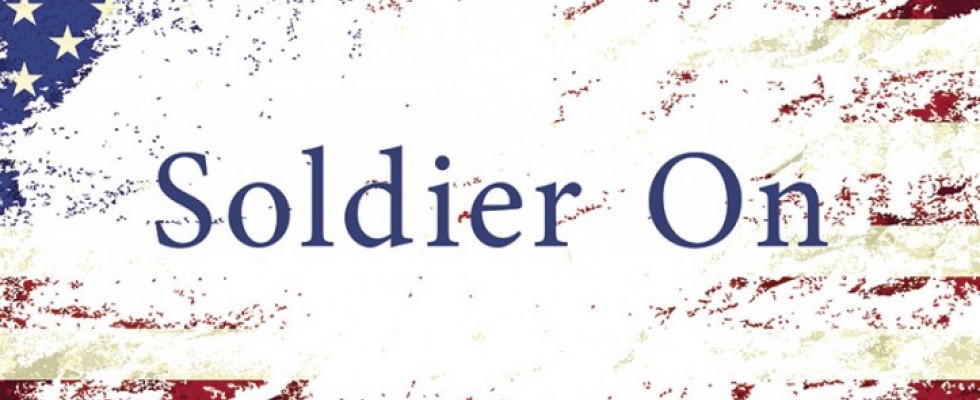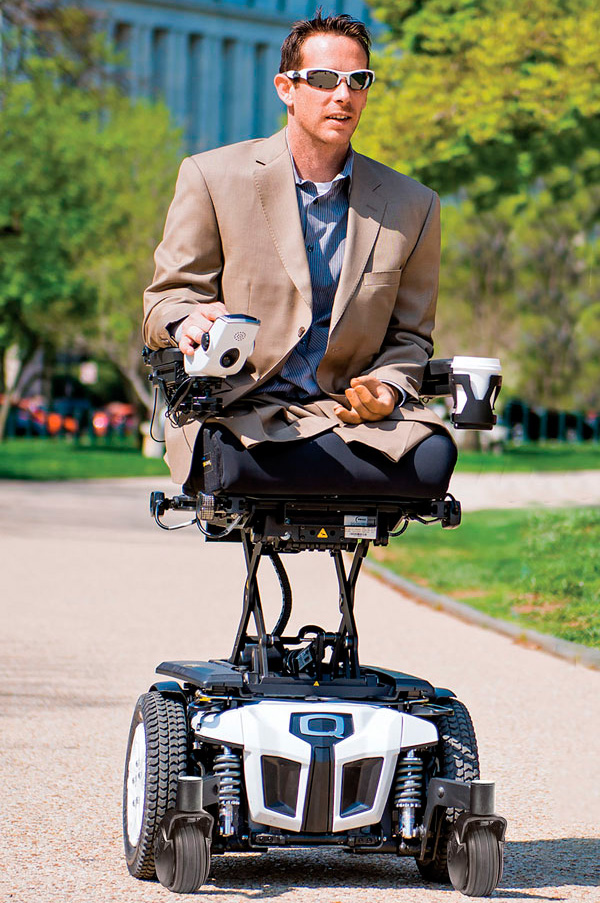
 Bryan Anderson and his iLevel power chair
Bryan Anderson and his iLevel power chairBryan Anderson is an American hero. He enlisted in the Army in 2001 and began his first active duty tour on September 11 of that year, just as the U.S. was thrust into a conflict that would continue for more than a decade. Anderson served two tours in Iraq before being severely injured when an Improvised Explosive Device (IED) struck his Humvee in 2005. Anderson lost both legs and his left hand, and was awarded the Purple Heart for his service. Yes, by anyone's definition, he is an American hero.
But serving in the armed forces is not the only heroic act of Bryan Anderson. After 13 months of rehabilitation at Walter Reed Army Hospital, countless attempts at newer and better prosthetics and several iterations of motorized wheelchairs, Anderson conducts his life much as any active young man would. From skiing to rock climbing to watersports, he remains as active, and as upbeat, as possible. Anderson, however, has done more than overcome his own injuries. He has become an advocate for others in similar situations. He is an ambassador for the Gary Sinise Foundation, the co-author of his memoir, No Turning Back, and the national spokesperson for Quantum Rehab, a Pride Mobility Products company. In effect, Bryan Anderson continues his own rehabilitation journey by speaking for others.
You have said in past interviews that while your situation changed after your accident, it didn't change your life plan. Does that still ring true, or do you think your plan has adapted based on experience?
Going through a life-changing accident, in my experience, doesn't change who we are inside. Yes, it changes the way we may physically live, and we learn from that in different ways, but our hopes, dreams and goals don't change. I always wanted to be in movies, and always loved adrenaline sports. My injury didn't change those dreams and goals, and I'm fortunate to be living them.
If you had to define one pivotal moment for you since your accident, could you do so? And if so, can you describe it?
There's so much life to live that I'm not sure there's ever one pivotal moment, but many. One I recall was being at Walter Reed, in the hospital for so long, and being able to finally take my power chair to the mall by myself. It felt so freeing. There are so many seemingly little things that we never think about until they're missing from our lives. Going to the mall was like the initial gateway to my independence.
Most of the press surrounding your story details your perseverance and "never give up" attitude. Can you describe a time when you may have thought about giving up?
I think all of us have down moments. You probably have, right? But, something pulls us back for a reason. During my down moments, I try to come back to what I've gained, not what I've lost. I've come this far, don't quit now—there's so much more to do!
Again that same press portrays you as a role model; how accurate do you think this depiction is, and how comfortable are you with that responsibility? I don't see myself as a role model, but I realize some do. There's nothing different about me than others except for the circumstances of my accident. The best any of us can do is adapt, grow and live on to the best of our abilities. I think being a role model is best served by being ourselves.
Much coverage has been given to the environment that U.S. soldiers face when returning from Iraq and Afghanistan, in comparison with the environment veterans experienced when returning from Vietnam—the prevailing message being that society is now more accepting. Do you believe that America truly sees these returning soldiers differently? Do soldiers feel the same? How does this impact your message?
I only truly know my own experience, and every soldier's experience is different. War is war, and although times change, its impact can be profound for soldiers. I think it's important to recognize the needs of soldiers of all generations.
How would you describe the experience of co-authoring your memoir, No Turning Back? Was there a sense of catharsis in putting words down on paper?
It can be a strange process looking back in such detail on every aspect of your life, but also empowering. It gave me the chance to kind of see how far I'd come, and there was strength in that. It's also humbling because you could write a book about so many other soldiers, so I felt honored to share my story.
You have said that Pride's iLevel chair "gives you your dignity back." How has your life been impacted by the implementation of the iLevel technology and the integration of the chair into your routine?
My injury didn't change who I was, but it did change how I functioned, and the way others saw me. To go from standing height to seated height in a wheelchair due to an accident is a totally different worldview—literally. So, to be back at standing height because of iLevel truly has brought back the way I used to see and interact with the world around me. Maybe dignity isn't the right word, but it's given certain parts of my life back by being at eye level—or iLevel!
Working with Pride has allowed you to speak to thousands of people, relaying the message that down does not equal out and that mobility is possible in most circumstances. Your story and those of others in similar circumstances continue to fuel research and development in mobility technology. How has your relationship with Pride contributed to your overall life plan, and how would you like to see the two things work together in the future?
In two words: Endless possibilities. When I see the amazing progress with technology that Pride and Quantum are making, along with my own life's progress, future possibilities seem limitless. I can't wait to see what the future holds for both! What do you think 2016 will bring for you? My motto has always been,"Live, Love, Thrive," and I'm more excited than anyone to see what 2016 has in store for me. I love serving others, so beyond acting and power chair development, I look forward to being on the road as much as possible, connecting with others about the power we all possess to thrive no matter the adversity.
